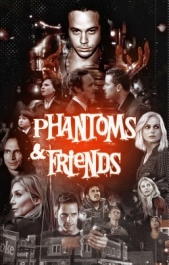Paper Towns

Paper Towns читать книгу онлайн
When Margo Roth Spiegelman beckons Quentin Jacobsen in the middle of the night — dressed like a ninja and plotting an ingenious campaign of revenge — he follows her. Margo's always planned extravagantly, and, until now, she's always planned solo. After a lifetime of loving Margo from afar, things are finally looking up for Q. . until day breaks and she has vanished. Always an enigma, Margo has now become a mystery. But there are clues. And they're for Q. Printz Medalist John Green returns with the trademark brilliant wit and heart-stopping emotional honesty that have inspired a new generation of readers.
Внимание! Книга может содержать контент только для совершеннолетних. Для несовершеннолетних чтение данного контента СТРОГО ЗАПРЕЩЕНО! Если в книге присутствует наличие пропаганды ЛГБТ и другого, запрещенного контента - просьба написать на почту [email protected] для удаления материала
For the first time in weeks, she seemed completely and undeniably alive to me. She was alive. For one more day at least, she was alive. I had focused on her whereabouts for so long in an attempt to keep me from obsessively wondering whether she was alive that I had no idea how terrified I’d been until now, but oh, my God. She was alive.
I jumped up, let the towel drop, and called Radar. I cradled the phone in the crook of my neck while pulling on boxers and then shorts. “I know what paper towns means! Do you have your handheld?”
“Yeah. You should really be here, dude. They’re about to make us line up.”
I heard Ben shout into the phone, “Tell him he better be naked!”
“Radar,” I said, trying to convey the importance of it. “Look up the page for Agloe, New York. Got it?”
“Yes. Reading. Hold on. Wow. Wow. This could be the Catskills spot on the map?”
“Yes, I think so. It’s pretty close. Go to the discussion page.”
“. .”
“Radar?”
“Jesus Christ.”
“I know, I know!” I shouted. I didn’t hear his response because I was pulling my shirt on, but when the phone got back to my ear, I could hear him talking to Ben. I just hung up.
Online, I searched for driving directions from Orlando to Agloe, but the map system had never heard of Agloe, so instead I searched for Roscoe. Averaging sixty-five miles per hour, the computer said it would be a nineteen-hour-and-four-minute trip. It was two fifteen. I had twenty-one hours and forty-five minutes to get there. I printed the directions, grabbed the keys to the minivan, and locked the front door behind me.
“It’s nineteen hours and four minutes away,” I said into the cell phone. It was Radar’s cell phone, but Ben had answered it.
“So what are you going to do?” he asked. “Are you flying there?”
“No, I don’t have enough money, and anyway it’s like eight hours away from New York City. So I’m driving.”
Suddenly Radar had the phone back. “How long is the trip?”
“Nineteen hours and four minutes.”
“According to who?”
“Google maps.”
“Crap,” Radar said. “None of those map programs calculate for traffic. I’ll call you back. And hurry. We’ve got to line up like right now!”
“I’m not going. Can’t risk the time,” I said, but I was talking to dead air. Radar called back a minute later. “If you average sixty-five miles per hour, don’t stop, and account for average traffic patterns, it’s going to take you twenty-three hours and nine minutes. Which puts you there just after one P.M., so you’re going to have to make up time when you can.”
“What? But the—”
Radar said, “I don’t want to criticize, but maybe on this particular topic, the person who is chronically late needs to listen to the person who is always punctual. But you gotta come here at least for a second because otherwise your parents will freak out when you don’t show when your name is called, and also, not that it is the most important consideration or anything, but I’m just saying — you have all our beer in there.”
“I obviously don’t have time,” I answered.
Ben leaned into the phone. “Don’t be an asshat. It’ll cost you five minutes.”
“Okay, fine.” I hooked a right on red and gunned the minivan— it had better pickup than Mom’s but only just barely— toward school. I made it to the gym parking lot in three minutes. I did not park the minivan so much as I stopped it in the middle of the parking lot and jumped out. As I sprinted toward the gym I saw three robed individuals running toward me. I could see Radar’s spindly dark legs as his robe blew up around him, and next to him Ben, wearing sneakers without socks. Lacey was just behind them.
“You get the beer,” I said as I ran past them. “I gotta talk to my parents.”
The families of graduates were spread out across the bleachers, and I ran back and forth across the basketball court a couple times before I spotted Mom and Dad about halfway up. They were waving at me. I ran up the stairs two at a time, and so was a little out of breath when I knelt down next to them and said, “Okay, so I’m not going [breath] to walk, because I [breath] think I found Margo and [breath] I just have to go, and I’ll have my cell phone on [breath] and please don’t be pissed at me and thank you again for the car.”
And my mom wrapped her hand around my wrist and said, “What? Quentin, what are you talking about? Slow down.”
I said, “I’m going to Agloe, New York, and I have to go right now. That’s the whole story. Okay, I gotta go. I’m crunched for time here. I have my cell. Okay, love you.”
I had to pull free from her light grasp. Before they could say anything, I bounded down the stairs and took off, sprinting back toward the minivan. I was inside and had the thing in gear and was starting to move when I looked over and saw Ben sitting in the passenger’s seat.
“Get the beer and get out of the car!” I shouted.
“We’re coming with,” he said. “You’d fall asleep if you tried to drive for that long anyway.”
I turned back, and Lacey and Radar were both holding cell phones to their ears. “Gotta tell my parents,” Lacey explained, tapping the phone. “C’mon, Q. Go go go go go go.”
PART THREE
The Vessel
The First Hour
It takes a little while for everyone to explain to their parents that 1. We’re all going to miss graduation, and 2. We’re driving to New York, to 3. See a town that may or may not technically exist, and hopefully 4. Intercept the Omnictionary poster, who according to the Randomly capitalized Evidence is 5. Margo Roth Spiegelman.
Radar is the last to get off the phone, and when he finally does, he says, “I’d like to make an announcement. My parents are very annoyed that I’m missing graduation. My girlfriend is also annoyed, because we were scheduled to do something veryspecial in about eight hours. I don’t want to get into details about it, but this had better be one fun road trip.”
“Your ability to not lose your virginity is an inspiration to us all,” Ben says next to me.
I glance at Radar through the rearview mirror. “WOOHOO ROAD TRIP!” I tell him. In spite of himself, a smile creeps across his face. The pleasure of leaving.
By now we are on I-4, and traffic is fairly light, which in and of itself is borderline miraculous. I’m in the far left lane driving eight miles an hour over the fifty-five-miles-per-hour speed limit, because I heard once that you don’t get pulled over until you’re going nine miles an hour over the speed limit.
Very quickly, we all settle into our roles.
In the wayback, Lacey is the provisioner. She lists aloud everything we currently have for the trip: the half of a Snickers that Ben was eating when I called about Margo; the 212 beers in the back; the directions I printed out; and the following items from her purse: eight sticks of wintergreen gum, a pencil, some tissue, three tampons, one pair of sunglasses, some ChapStick, her house keys, a YMCA membership card, a library card, some receipts, thirty-five dollars, and a BP card.
From the back, Lacey says, “This is exciting! We’re like under-provisioned pioneers! I wish we had more money, though.”
“At least we have the BP card,” I say. “We can get gas and food.”
I look up into the rearview mirror and see Radar, wearing his graduation gown, looking over into Lacey’s purse. The graduation gown has a bit of a low-cut neck, so I can see some curled chest hairs. “You got any boxers in there?” he asks.
“Seriously, we better be stopping at the Gap,” Ben adds.
Radar’s job, which he begins with the calculator on his handheld, is Research and Calculations. He’s alone in the row of seats behind me, with the directions and the minivan’s owner’s manual spread out next to him. He’s figuring out how fast we need to travel in order to make it by noon tomorrow, how many times we’ll need to stop in order to keep the car from running out of gas, the locations of BP stations on our route and how long each stop will be, and how much time we’ll lose in the process of slowing down to exit.























